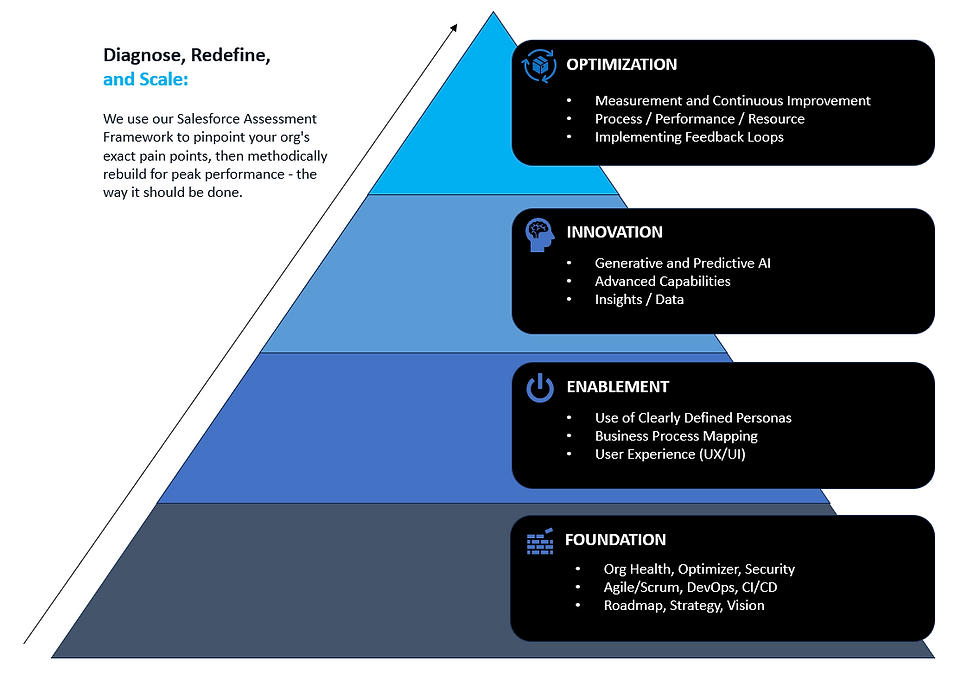Launching Your Salesforce Journey: DIY or Partner Up? A Guide for Small Businesses
- Jon Ewoniuk
- Feb 18, 2024
- 3 min read
For small businesses with 10-50 employees, exploring a CRM like Salesforce can be a game-changer. But getting started can feel daunting. The question arises: Should you tackle it yourself (DIY) or seek help from an external vendor/partner?
Here's a breakdown of both approaches, helping you decide what's best for your unique needs:
The DIY Route:
Pros:
Cost-effective: You avoid initial implementation costs associated with partnering with a vendor.
Flexibility: You have complete control over the customization and configuration of your Salesforce instance.
Self-reliance: You gain valuable knowledge and experience by setting up and managing the system yourself.
Cons:
Time Commitment: Learning Salesforce and implementing it effectively requires significant time investment, potentially hindering other business operations.
Limited Expertise: Setting up and maintaining a complex system like Salesforce can be challenging without prior experience or technical knowledge.
Ongoing Support: Troubleshooting issues, keeping up with updates, and ensuring optimal performance might require additional resources or external assistance in the long run.
Partnering with a Vendor/Partner:
Pros:
Expertise and Guidance: Experienced partners can guide you through the entire process, from initial setup to ongoing optimization.
Faster Implementation: Leverage their expertise to get your Salesforce up and running efficiently, minimizing disruptions to your business.
Ongoing Support: Access continuous support for troubleshooting, customization, and ensuring your system evolves alongside your business needs.
Cons:
Cost: Vendor fees can add to your initial and ongoing expenses.
Dependency: You rely on the vendor's expertise and availability for ongoing support and maintenance.
Finding the Right Fit: Choosing the right partner with the appropriate experience and alignment with your specific needs is crucial.
Making the Decision:
Consider these factors:
Your Budget: Assess your financial resources and weigh the initial and ongoing costs of both options.
Your Team's Expertise: Evaluate your team's technical skills and comfort level with learning and managing Salesforce.
Your Time Constraints: Consider the time commitment required for DIY implementation and weigh it against your existing workload.
Your Growth Plans: If you anticipate rapid growth or complex customization needs, partnering with a vendor might be more sustainable in the long run.
Here's a general recommendation:
For businesses with limited technical expertise, tight budgets, and a willingness to invest time in learning, the DIY approach can be a viable option. Start with Salesforce Essentials, utilize online resources, and seek community support when needed.
For businesses with limited time, complex needs, or a desire for expert guidance, partnering with a vendor can be a strategic investment. Look for partners with experience in your industry and a proven track record of success with small businesses.
Remember, there's no one-size-fits-all solution. Evaluate your specific needs and resources carefully before deciding whether to embark on the Salesforce journey solo or team up with a trusted partner.
Need help figuring out the best approach for your business? Book a Free Call here.
By: Jon Ewoniuk
Book a Free Call here.
Jon is the Founder | Consultant at Peak360 IT. Peak360 IT helps companies solve technical, resource, and implementation challenges on the Salesforce platform. Founded in 2014, Peak360 IT is a Salesforce SI Partner that specializes in Sales Cloud, Service Cloud, Experience Cloud - and implementing custom applications and automations on the Salesforce Platform.
With our backgrounds in Software Development, Technology, and Consulting - Peak360 IT has a reputation for developing custom integrations using various technologies, such as MuleSoft, Google Apigee, and other SOA/API frameworks.



Comments